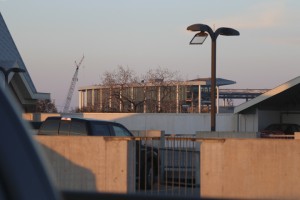
By Jordan Corona
Staff Writer
When 40,000-45,000 sports fans infiltrate the Baylor Bubble next football season, the university will begin enforcing a new parking policy to make room for more vehicles on campus.
“Our plan is to use the Dutton garage on game days as part of game day parking,” said Brian Nicholson, associate vice president for facilities, planning and construction. “That means if there are students are parking in there Fridays and Saturdays, they’ll have to move their cars.”
Karl McNair, director of real estate services, said students using the Speight Parking Facility and the Baylor Law School parking lot would also be subject to the new requirement.
The vacated spaces will be available to people who purchase a game day parking pass for their vehicle through parking services. Prices for the pass are not finalized. Starting fall 2014, students without a game day parking permit will be required to move their cars from the Dutton and Speight garages and the law school parking lot on home game weekends to make room for visitors with the tag. Otherwise, students who leave their cars in these areas will be towed.
In an email to the Lariat, Matt Penney, director for parking services, said exact protocol for enforcing the new campus parking policy has yet to be finalized. The price for ordinary campus parking passes will not change because of the new rule.
But the new rule activates nearly 2,400 parking spots on campus for visitors with the game day parking permit, not including 2,500 at the Ferrell Center. When Floyd Casey Stadium hosted its last game, 8,900 student tickets left the box office. If numbers are anything like that next season, students without the new parking pass have less than 7,500 parking spaces to share on campus.
According to Baylor athletics stadium website, the university will accommodate the influx of campus visitors expected next football season with 11,500 parking spaces. Since most of the 2,500 stadium site parking spaces are reserved for donors and season ticket holders, a majority of campus game attendees will need to find a place to leave their vehicles among the remaining 9,000 spots elsewhere.
Weslaco freshman Victoria Lopez said the parking lot at the stadium should be bigger.
“Or what if they added a parking lot to campus?” she said. “I mean the students bought parking passes for a reason.”
When university officials contracted Boston traffic consulting firm Parsons Binkerhof, the best parking option was written into the project layout, Nicholson said.
The new parking protocol is just one part of a series of changes school officials are making to manage at least 40,000 fans-worth of new traffic expected on campus next season.
Though an exact mechanism for enforcing the second part of the campus parking protocol has yet to be determined, Nicholson said the university also plans to close off other lots on campus for students to use during game day weekends.
“It’s basically redistributing traffic patterns,” McNair said.
Redistributing on campus will take some getting used to. For the sake of the community, city officials agreed to provide five free parking lots downtown for game day attendees to use.





